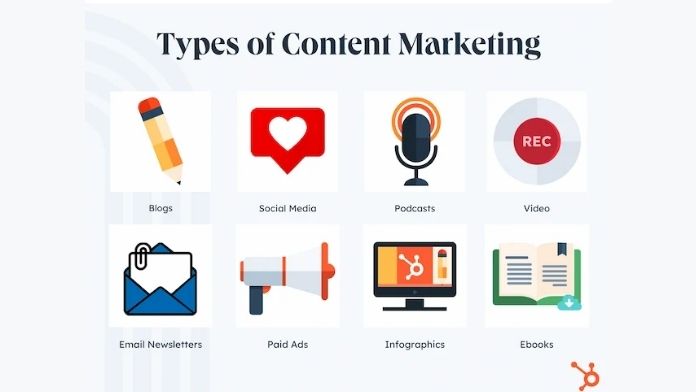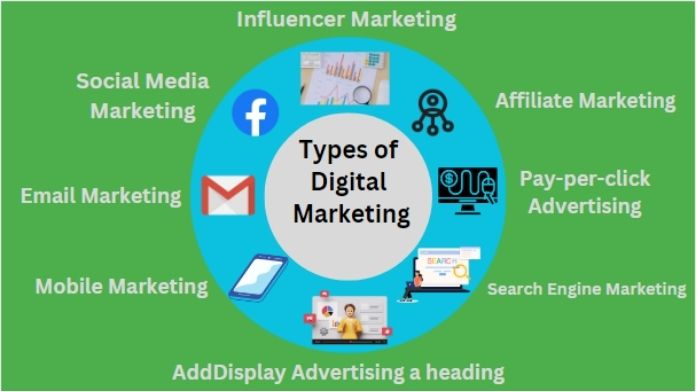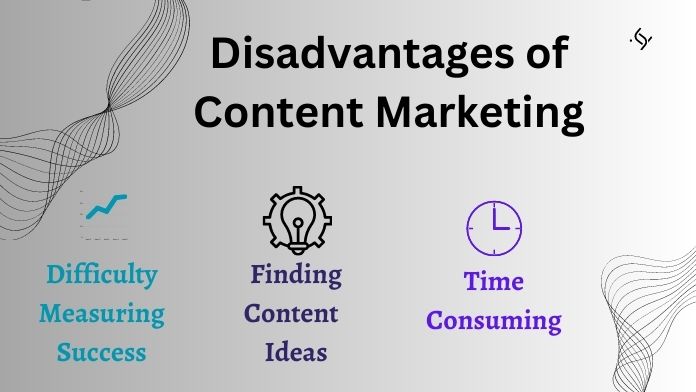Content marketing focuses on creating and distributing valuable, relevant content to attract and engage a target audience. Digital marketing encompasses broader online strategies, including content marketing, to promote products or services, utilizing various digital channels such as social media, SEO, and email.
Differences Between Content Marketing and Digital Marketing
One key difference between content marketing and digital marketing lies in their effective strategy and approach to marketing. Firstly, content marketing is a strategic approach focusing on creating and distributing valuable content to attract and engage a clearly defined audience.
In addition, content marketing aims to build trust and establish thought leadership. On the other hand, digital marketing encompasses a broader range of tactics and channels, including paid advertising, social media marketing, and search engine optimization.
Furthermore, digital marketing often relies on data and analytics to target specific audience segments and measure campaign performance. In conclusion, while both content marketing and digital marketing aim to achieve marketing goals, they employ distinct strategies and tactics to reach their objectives.
On the other hand, digital marketing is a more tactical approach that focuses on promoting products or services through various digital channels, such as search engines, social media, and email.
| Content Marketing | Digital Marketing |
| Content marketing primarily focuses on creating and distributing valuable and relevant content to attract and engage audiences. | Digital marketing focuses on promoting products or services through various digital channels. |
| Content marketing primarily uses blogs, videos, social media, and podcasts to attract and engage audiences. | Digital marketing employs various tactics, including search engine optimization, social media advertising, email marketing, and pay-per-click advertising. |
| Content marketing primarily targets a specific audience. | Digital marketing targets a broader audience through various digital channels. |
What is Content Marketing
Content marketing is strategically creating and distributing valuable and relevant content to attract and engage a target audience. Moreover, it aims to build brand authority and establish lasting connections with potential customers.
In addition, the content should address the pain points of the audience and provide valuable solutions. Consequently, this approach can lead to increased website traffic and higher conversion rates.
However, to achieve successful content marketing, consistent efforts and a deep understanding of the target audience are crucial.
Definition and Purpose of Content Marketing
Content marketing is a strategic marketing approach that involves creating and distributing valuable and relevant content to attract and engage a clearly defined audience, aiming to drive profitable customer action.
Content marketing aims to provide consumers with useful information and resources that can help solve their problems or answer their questions while also building trust and authority for the brand.
The content created for content marketing can take many different forms, such as blog posts, videos, social media updates, podcasts, and more.
The key is to create content relevant to the target audience and aligned with the brand’s overall marketing goals. It’s crucial to let content marketing complement the larger digital marketing plan and vice versa for an effective and comprehensive marketing strategy.
The benefits of content marketing include the following:
- Building brand awareness.
- Driving traffic to the brand’s website or social media channels.
- Generating leads.
- Establishing thought leadership in the industry.
By providing valuable content to consumers, brands can attract and engage potential customers and build trust over time.
To succeed at content marketing, brands need to clearly understand their target audience and the types of content that will resonate with them.
They also need to have a content strategy that outlines the types of content to create, how to distribute it, and how to measure success.
Types of Content Marketing

Content marketing includes blog posts, infographics, videos, podcasts, whitepapers, eBooks, social media updates, case studies, and more.
Each type of content serves a unique purpose and can target different stages of the buyer’s journey.
For example, blog posts and social media updates are great for attracting new audiences. At the same time, case studies and whitepapers are better suited for prospects further along in the sales funnel.
The key is to create relevant and valuable content for the target audience while aligning with the brand’s overall marketing goals.
Benefits of Content Marketing
The benefits of content marketing include the following:
- Building brand awareness.
- Establishing thought leadership.
- Attracting and engaging potential customers.
- Driving traffic to the brand’s website.
- Generating leads.
- Building long-term relationships with customers.
Content marketing provides consumers with valuable information and resources that can help solve their problems or answer their questions, building trust and authority for the brand.
By consistently creating and distributing valuable content, brands can build a loyal audience more likely to become customers in the long run, resulting in increased revenue and profitability.
Disadvantages of Content Marketing
While it is important to incorporate content marketing in your marketing strategy, this approach has some downsides. The content needs a specialist expertise on a particular topic or can require a lot of research.
If we don’t provide good quality content to a targeted audience, then we will not get any more success. One of the disadvantages is indirect, long-term strategies.
Some other marketing strategies give faster results and are primarily geared toward selling. I take some time building up valuable content in my sales funnel.
What is Digital Marketing
All digital marketing includes content marketing. Examples include Google AdWords, Pay Per Click, email marketing, video marketing, etc.
Definition and Purpose of Digital Marketing
Digital marketing refers to using digital channels to promote products or services. Its purpose is to reach and engage a wider audience through various online platforms, such as search engines, social media, and email.
There are several types of digital marketing, including search engine optimization (SEO), pay-per-click advertising (PPC), social media marketing, email marketing, and content marketing.
A digital marketing agency can provide various digital marketing services, such as website design, social media management, and online advertising.
To create an effective digital marketing strategy, it is important to understand the target audience, goals, and budget. A digital marketing course can provide valuable insights and skills for creating and implementing such a strategy.
Digital marketing tools, such as Google Analytics and SEMrush, can help to measure and optimize campaigns for maximum ROI.
A digital marketing PDF can comprehensively guide digital marketing principles, tactics, and best practices.
Digital marketing has become an essential aspect of any marketing strategy, and businesses of all sizes can benefit from its many advantages.
Types of Digital Marketing
Digital marketing encompasses the full “solar system” of online advertising and marketing through channels like your website, video marketing, email, mobile devices, search engines, and social media channels.
This content supports education, like a blog and social media posts, tutorial videos, customer nurturing email or SMS campaigns, checklists, infographics, and press releases. See here how digital marketing works and the need to mainly do keyword research.

- Search Engine Optimization (SEO): Optimizing website content for search engine rankings.
- Search Engine Marketing (SEM): Paid advertising in search engine results.
- Social Media Marketing: Promoting products or services on social media platforms.
- Email Marketing: Sending promotional emails to a targeted list of subscribers.
- Pay-per-click Advertising (PPC): Placing ads on search engines or other websites
- Affiliate Marketing: Partnering with affiliates to promote products or services.
- Influencer Marketing: Partnering with social media influencers to promote products or services.
- Display Advertising: Placing banner or video ads on websites or social media platforms.
- Mobile Marketing: Marketing through mobile devices such as smartphones and tablets.
- Content Marketing: Creating and sharing valuable content to attract and retain customers.
Benefits of Digital Marketing
Digital marketing offers numerous benefits to businesses, including increased brand awareness, targeted audience reach, higher website traffic and conversions, cost-effectiveness, and measurable ROI.
By partnering with a digital marketing agency, businesses can leverage the expertise and resources of experienced professionals to develop and execute effective digital marketing strategies.
Digital marketing courses can also provide valuable training and skills for individuals seeking to pursue a career in the industry.
Various digital marketing tools and services are available to help businesses optimize their online presence and reach their target audience.
Digital marketing PDF resources can also provide valuable insights and best practices for successful digital marketing campaigns.
Disadvantages of Digital Marketing

Although digital marketing has great flexibility, it has drawbacks. If you run an advertising program that converts users quickly, you will likely get more resistance from the user base. This is because users are now learning to shut down advertisements.
Occasionally they can be aggressive or too pushy and reduce their effectiveness. How can a marketing technique overcome resistance? Digital marketing is also vulnerable to disruptions and technologies.
Content Marketing vs Digital Marketing
Content marketing and digital marketing are closely related terms but have distinct meanings. As a result, content marketing is a strategy that uses valuable information to attract fans and develop brands.
Digital marketing is a broad term covering all ways you can advertise products using the internet.
Content marketing strategy involves creating and distributing valuable, relevant, and consistent content to attract and retain a clearly defined audience—and, ultimately, to drive profitable customer action.
Digital marketing uses digital channels like websites, social media, email, and search engines to promote or sell products or services.
So, using content marketing with supporting digital marketing tactics helps reach potential customers at many points of their customer journey (Open Link in new window), fortifying your brand’s digital impact.
Here are some of the key differences between content marketing and digital marketing:
Content marketing is focused on creating and distributing valuable content, while digital marketing is focused on using digital channels to promote products or services.
Content marketing strategy is a long-term strategy, while digital marketing can be used for short-term and long-term goals.
Also, content marketing is more indirect and subtle, while digital marketing is more direct and upfront.
Content marketing is more focused on building customer relationships, while digital marketing is more focused on driving sales.
The Strengths and Weaknesses of Both Approaches
Content marketing’s strength is building brand awareness and trust, while digital marketing’s strength is generating immediate conversions and sales.
But, content marketing’s weakness is measuring ROI, while digital marketing’s weakness is the potential for oversaturation and audience fatigue.
Content marketing is ideal for businesses focused on long-term brand building and establishing thought leadership. In contrast, digital marketing is ideal for businesses that need to quickly reach a broad audience and generate revenue.
Content marketing is effective in attracting and engaging a specific target audience, while digital marketing has the potential to reach a wider audience.
The strengths and weaknesses of each approach depend on the business’s goals, budget, and resources, and a combination of both may be the most effective marketing strategy.
Strengths of Content Marketing and Weaknesses
| Strengths of Content Marketing | Weaknesses of Content Marketing |
| Builds trust and credibility with audiences. | Time-consuming to create and distribute content. |
| Increases brand awareness and thought leadership. | Results can take time to see. |
| Drives long-term organic traffic and engagement. | Difficult to measure and quantify ROI. |
| Cost-effective compared to other forms of marketing. | Requires consistent effort to maintain effectiveness. |
| Builds a loyal audience that can drive word-of-mouth marketing | It may not be effective for short-term sales or conversions. |
Strengths of Digital Marketing and Weaknesses
| Strengths of Digital Marketing | Weaknesses of Digital Marketing |
| Targets specific audiences through various digital channels. | It can be costly, especially for competitive keywords or markets. |
| Offers immediate and measurable results. | Ad fatigue and ad blockers can reduce effectiveness. |
| It can be highly effective for short-term sales and conversions. | May not build long-term relationships with customers. |
| It can be automated for efficiency. | Requires continuous investment to maintain effectiveness. |
| Offers precise tracking and measurement of ROI. | It can be seen as intrusive or spammy by some audiences. |
Importance of Both in Today’s Marketing Landscape
Content and digital marketing are crucial in reaching and engaging with audiences in today’s marketing landscape. Digital marketing helps businesses to increase brand awareness and reach a wider audience through various online channels, such as social media, search engines, and email.
On the other hand, content marketing is essential for building long-term relationships with customers by providing valuable and relevant content that addresses their needs and interests.
Social media marketing is an essential component of both digital marketing and content marketing strategies. Social media platforms allow businesses to engage with audiences, build brand loyalty, and promote their products or services.
Content marketing focuses on creating high-quality content that resonates with audiences and provides value. Social media marketing focuses on building a presence and engaging with followers.
Both digital marketing and content marketing are essential for businesses in today’s marketing landscape. While digital marketing helps businesses reach a wider audience, content marketing is essential for building long-term relationships and customer trust.
A successful marketing strategy should incorporate both approaches, complementing each other and benefiting businesses differently.
Conclusion
The choice between digital and content marketing depends on a business’s goals and target audience.
Digital marketing focuses on promoting products and services through digital channels, and content marketing aims to create valuable content to attract and engage audiences.
Both strategies have their strengths and weaknesses, and a combination of both may be the most effective approach.
Social media marketing vs. content marketing is another consideration, as social media can be a powerful platform for both types of marketing.
Digital marketing encompasses all your online marketing channels, search engines, social media, and even content marketing.
The choice between marketing and digital marketing comes down to the specific needs of a business.
For those interested in a career in content marketing, many opportunities are available, with content marketing salaries varying based on experience and location.
Whether digital marketing vs. online marketing or social media vs. content marketing, businesses must carefully consider their options. Comment here.
FAQ
What is Content and Digital Marketing?
Uncover the essence of content marketing and digital marketing. Firstly, gain insights into their definitions, roles, and significance in the modern business landscape.
Moreover, learn how these powerful digital strategies can elevate your brand’s online presence and engage your target audience effectively. Additionally, staying ahead in the digital realm requires a solid understanding of content and digital marketing efforts.
Therefore, equip yourself with these valuable insights to drive success in your digital endeavors. In conclusion, mastering content and digital marketing can significantly impact your brand’s growth and success in the competitive online world.”
What is Content Marketing in SEO?
Learn how content marketing plays a crucial role in SEO. Firstly, understand the importance of creating high-quality and relevant content to boost organic traffic and improve search engine rankings.
Additionally, discover effective strategies and techniques to optimize your content. Moreover, implementing these techniques consistently can result in long-term success.
In addition to that, it’s essential to monitor and analyze the performance of your content regularly. Finally, in conclusion, mastering content marketing is key to achieving sustainable SEO growth.
What is Content Marketing Examples?
Explore the world of content marketing with real-life examples. Discover how successful brands leverage engaging blogs, videos, infographics, and more to connect with their target audience.
Any online advertising, including online content marketing, is called digital marketing. Examples of digital marketing include SEO, pay-per-click advertising, video marketing, email marketing, and other forms of digital marketing.
Moreover, unlocking the power of content marketing can significantly elevate your brand’s visibility, engagement, and conversions. Specifically, by leveraging content marketing strategies, you can effectively engage with your target audience and drive conversions.
Additionally, content marketing allows you to establish your brand as an authority and build trust among your customers.
Therefore, it is crucial to understand and implement content marketing strategies to maximize the potential of your digital marketing efforts.
What is the Difference Between Content Strategy and Digital Marketing Strategy?
Understand the disparity between content strategy and digital marketing strategy. Learn how content strategy focuses on creating and distributing valuable content, while digital marketing strategy encompasses various online marketing channels and techniques.



